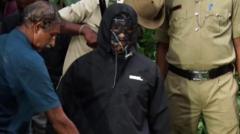India’s Election Commission of India (ECI) is being put to the credibility test as various opposition parties raise serious allegations of voter misconduct and electoral manipulation. Following a series of protests against the body, opposition leaders, led by Congress figure Rahul Gandhi, have unrolled a 16-day "Voter Rights March" to rally public support and bring attention to perceived electoral discrepancies, specifically targeting the revised voter rolls in Bihar ahead of impending state elections.
India's Election Commission Faces Credibility Crisis Amid Growing Opposition Allegations

India's Election Commission Faces Credibility Crisis Amid Growing Opposition Allegations
Opposition parties are ramping up pressure on India's Election Commission over allegations of electoral malpractice as it grapples with trust issues among the public.
Allegations of voter fraud have emerged since August, with claims that over 100,000 illegitimate voters exist in Karnataka due to the ECI's alleged collusion with the ruling Bharatiya Janata Party (BJP). In a radical escalation, opposition figures even considered an impeachment motion against Chief Election Commissioner Gyanesh Kumar, although they have yet to gather the numbers to advance such a move. The Election Commission has robustly defended its processes, asserting that a special revision of electoral rolls aimed at ensuring accuracy led to the removal of millions of entries due to duplication and invalid IDs.
Gandhi's accusations, however, have fueled a storm of criticism. In response to the uproar, the ECI conducted a weekend press conference, emphasizing that terms like "vote theft" undermine the essence of India's democracy. As opposition rhetoric grows bolder, skepticism toward the ECI appears to deepen, evidenced by a recent survey indicating a notable decrease in public trust in the Commission after two years of democratic challenges.
Despite the ECI's assurances of maintaining election integrity, the ongoing turmoil has repercussions that extend beyond immediate claims, posing a significant concern for the institution's future legitimacy in the eyes of the electorate. Leading political analysts warn that without rigorous efforts to restore trust, the ECI may face enduring challenges to its authority, particularly as the 2024 general elections approach.
Gandhi's accusations, however, have fueled a storm of criticism. In response to the uproar, the ECI conducted a weekend press conference, emphasizing that terms like "vote theft" undermine the essence of India's democracy. As opposition rhetoric grows bolder, skepticism toward the ECI appears to deepen, evidenced by a recent survey indicating a notable decrease in public trust in the Commission after two years of democratic challenges.
Despite the ECI's assurances of maintaining election integrity, the ongoing turmoil has repercussions that extend beyond immediate claims, posing a significant concern for the institution's future legitimacy in the eyes of the electorate. Leading political analysts warn that without rigorous efforts to restore trust, the ECI may face enduring challenges to its authority, particularly as the 2024 general elections approach.

















